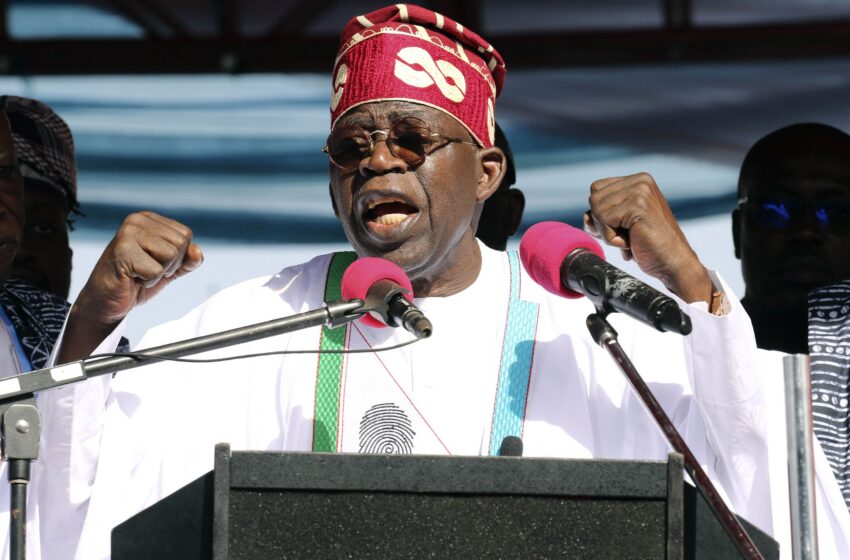#NigeriaDecides2023: How Obi, Atiku, Kwankwaso facilitated Tinubu’s election victory

Alex Sigman: The controversial ‘schoolmate’ in Tinubu’s academic drama
Nigeria’s most competitive presidential election since 1999 has come and gone. Bola Tinubu of the All Progressives Congress (APC) won the controversial election held on February 25, 2023 with a total of 8,794,726 votes.
He defeated Atiku Abubakar of the Peoples Democratic Party (PDP) and Peter Obi of the Labour Party (LP) who polled 6,984,520 and 6,101,533 votes respectively.
2023 presidential election: The full result#TheCableIndex #PresidentElect #NigeriaDecides2023 pic.twitter.com/W1kU0FJt3u
— TheCableIndex (@thecableindex) March 1, 2023
On Wednesday, the Independent National Electoral Commission (INEC) presented a Certificate of Return to the president-elect and Kashim Shettima, the vice-president elect.
However, controversies have continued to trail the election. The PDP and the LP, among other opposition parties, have vowed to challenge the outcome of the election in court, citing irregularities in the process.
For many Nigerians, the election was anything but credible. Last Saturday’s election was one of the most-anticipated in recent years — and for many reasons.
In the first place, many Nigerians — particularly the youths — want good leadership. This is due to the myriad of challenges currently facing the country.
Nigeria is faced with increased poverty level, insecurity, poor health infrastructure, ballooning out-of-school rate, and lingering unemployment.
The eight-year administration of President Muhammadu Buhari has done little to salvage the situation.
The foregoing, therefore, increased interest of many Nigerians in the election.
But if the mood across cities in the country after Tinubu’s victory at the polls is the anything to go by, it clearly shows the popular candidate did not win.
Many predicted Obi would win the election. To thousands of youths, the former governor of Ananmbra state is a shift from the status quo and possess the leadership acumen to inspire the country to greater heights.
States where presidential candidates secured wins#TheCableIndex #INECElectionResults pic.twitter.com/AsdSQIaNHV
— TheCableIndex (@thecableindex) March 1, 2023
How did Tinubu win against the odds?
Tinubu was a major force in the presidential race. His strong political network and wealth of experience in the country’s political landscape was considered his major strength by many of his supporters.
The former governor of Lagos, however, faced many odds.
The first was the growing resentment towards the APC-led government. Many Nigerians craved a change, a different party from the APC. The fuel scarcity and hardships caused by the naira redesign policy — few weeks to the election — heightened the anger of many for the ruling party.
The second was the reservations about APC’s Muslim-Muslim ticket. Tinubu and his running mate are both Muslims.
For a country like Nigeria with a large population of Christians, a Muslim-Muslim ticket is not the best idea for many. This is due to the fact that there have been allegations of attempts to Islamise Nigeria in the past.
Tinubu’s personality also posed a challenge for his presidential bid. The controversies around his age, health, education, wealth, and drug allegations against him were a threat to his chances at the polls.
But the former governor emerged winner against the odds due to various factors.
The first was the crisis that rocked the major opposition party, the PDP. The PDP came under heavy criticism over its failure to zone its presidential ticket to the south like the APC.
That eventually degenerated into more crisis and led to the departure of key figures like Obi, Rabiu Musa Kwankwaso, among others from the party.
There was further internal cracks within the party when five governors — Nyesom Wike (Rivers), Seyi Makinde (Oyo State), Ifeanyi Ugwuanyi (Enugu State), Samuel Ortom (Benue State), and Okezie Ikpeazu (Abia State) — known as the G-5 governors refused to support Atiku, its presidential candidate.
The five governors had demanded the resignation of Iyorchia Ayu, the national chairman of the PDP, for zoning the party’s presidential ticket to the north.
The division in the opposition camp facilitated Tinubu’s victory at the polls. For instance, the total votes garnered by the various factions in the PDP surpassed that of Tinubu.
Pundits argued that Obi would have stand a better chance if he worked with Kwankwaso of the New Nigeria Peoples Party (NNPP). The pair were initially on course for an alliance but fell out after failure to reach a compromise.
Therefore, the refusal of the opposition parties to form a strong alliance and work together was a major boost for Tinubu and ultimately aided his victory at the polls.
Presidential election: Old PDP vs APC#TheCableIndex #2023GeneralElections pic.twitter.com/37zh1DriO9
— TheCableIndex (@thecableindex) March 1, 2023
Another factor that facilitated Tinubu’s victory was the lapses in electoral process. INEC has come under fire since the election held over its failure to use the Bimodal Voter Accreditation System (BVAS) for live transmission of results as promised by the commission.
The refusal to transmit the election results from the polling units to INEC’s IREV portal gave room for various irregularities that facilitated Tinubu’s victory, according to opposition parties.
The coming days will likely witness intense legal battles against the election results as many political parties have vowed to challenge Tinubu’s victory in court.
Time will tell if Tinubu’s victory will stand or be reversed by the court.

